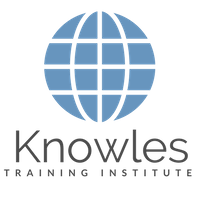Agile Project Management Training Course in Germany
Our corporate training course is also available in Berlin, Hamburg, Munich (München), Cologne (Köln), Frankfurt, Stuttgart, Düsseldorf, Dortmund, Essen, Leipzig, Bremen, Dresden, Hanover (Hannover), Nuremberg (Nürnberg), Duisburg, Bochum, Wuppertal, Bielefeld, Bonn, Münster, Karlsruhe, Mannheim, Augsburg, Wiesbaden, Gelsenkirchen, Mönchengladbach, Braunschweig, Kiel, Chemnitz, Aachen, Heidelberg, Rothenburg ob der Tauber, Freiburg, Trier, Regensburg, Würzburg, Potsdam, Lübeck, Rostock.
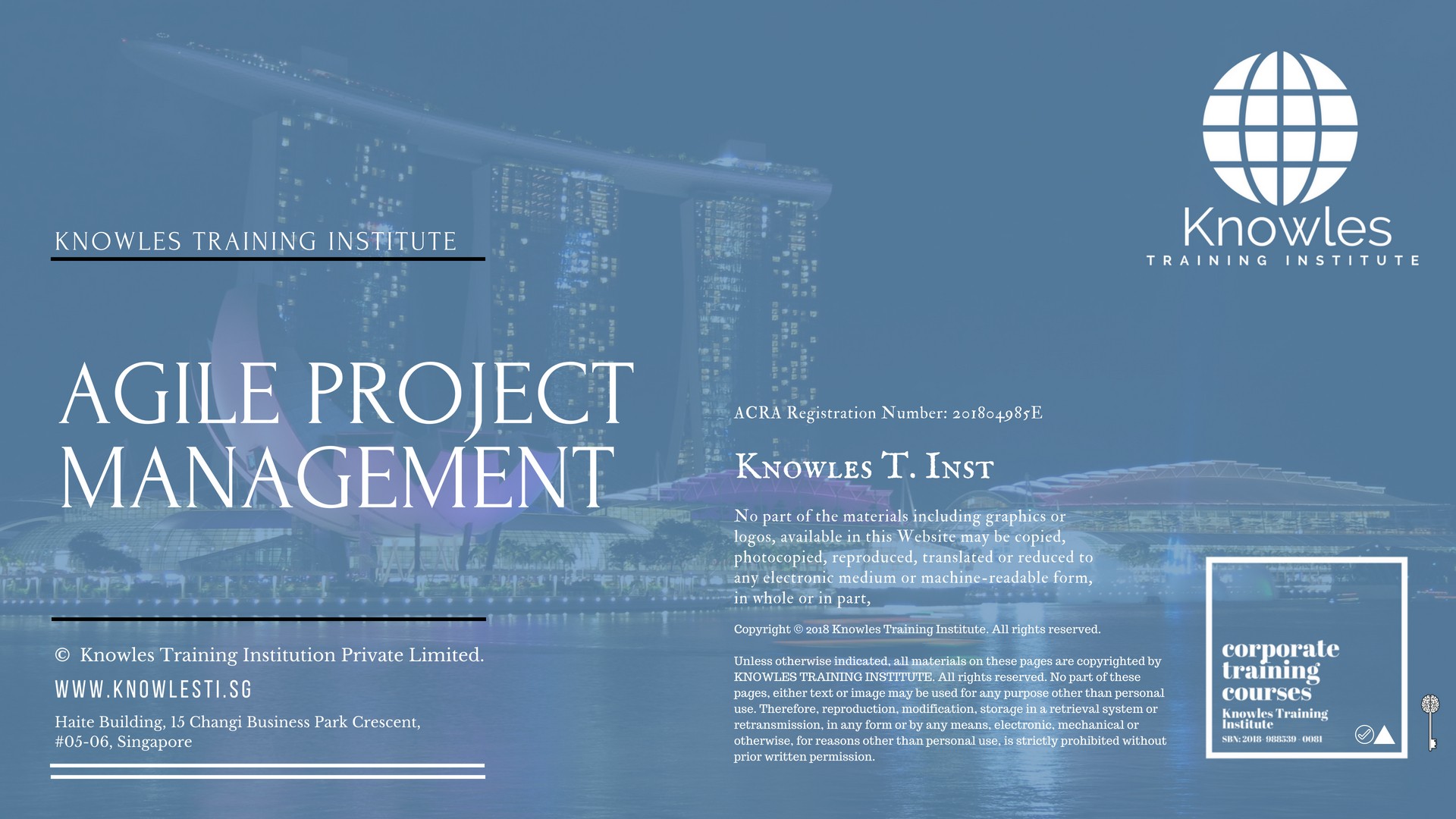
About This Agile Project Management Training Course in Germany
Agile Project Management Course in Germany
In the field of software development, it is an iterative approach for planning and leading projects aims to build collaboration and ability to respond in market trends. Agile is a methodology that requires collaborative efforts is able to move quickly and easily that intent solution.
It developed the Agile Manifesto that builds up for the foundation of agile movement, Signer Kent Beck developed Extreme Programming and Alister became the developer of Crystal Method who gives influential on the work of agile development. Jim, Highsmith, a man who translated the agile software concepts into agile project management.
Agile Project Management includes opportunity in creating a successful project as well as leading in the right path of software development. It also includes solving problems and setting up customer feedback. Agile management explained their priority whereas to satisfy the customer through valuable software. It also pursues that business persons and developer management will work together for the betterment of both.
One of the differences of agile from the waterfall was the approach of testing and quality. It has a lot of frameworks included such as Scrum, Agile modelling, Rapid Application Development (RAD), Dynamic System Development Method (DSBM), and etc. Agile follows practices and principles including project reflects, agile methodology of integration, planning, and etc.
Who Should Attend This Agile Project Management Training Course in Germany Workshop
This Agile Project Management Training Course in Germany workshop is ideal for anyone who would like to gain a strong grasp and improve their Agile Project Management.
All Staff Within An Organisation
Managers
Team Leaders
Executives
Assistants
Officers
Secretaries
Group Size For This Agile Project Management Training Program in Germany
The ideal group size for this Agile Project Management course is:
Minimum: 5 Participants
Maximum: 15 Participants
Course Duration For This Agile Project Management Skills Course in Germany
The duration of this Agile Project Management Training Course in Germany workshop is 2 full days. Knowles Training Institute Germany will also be able to contextualised this workshop according to different durations; 3 full days, 1 day, half day, 90 minutes and 60 minutes.
2 Full Days
9 a.m to 5 p.m
Agile Project Management Course Benefits
Below is the list of course benefits of our Agile Project Management course
- Creates smaller pieces of requirements which prioritized in terms of importance
- The framework promotes collaborative skills in solving concerns
- It lessens broad concerns, missed objectives and reduced risks
- It brings up execution of plan and brings into right path with flexibility
- It helps building higher quality of projects and higher customer satisfaction
- It provides transparency and productivity
- Increase focus in detection of issues and concerns
- Brings success through collaborative and project control
Agile Project Management Course Training Course in Germany Objectives
Below is the list of course objectives of our Agile Project Management course in Germany
- Recognizing and remembering prior ideas about the project approach
- Recitation of agile project management definition
- Understand the difference of Agile approach in another traditional project approach
- Explore the history and evolution of agile
- Analyze the principles of agile project management
- Critically examine the characteristics of agile project management
- Use knowledge in creating new in adopting agile
- Participate in the learning process and reacts in some way
- Integrate agile in software development
- Evaluate the importance and benefits of agile project management in the field of software development
- Identifying agile project management with scrum
- Achieve a higher rate of excellence using agile project approach
- Penetrate barriers and successful interchange in the market trends with the help of agile team
Course Content For This Agile Project Management Training Course in Germany
Below is the list of course content of our Agile Project Management programme course in Germany
- What is an agile project management cycle?
- What are the differences between agile and another project approach?
- What is the various framework of agile software development?
- How agile project management differs from traditional project approach?
- Why is agile project management necessary?
- What are the advantage and disadvantage of agile in project management?
- How agile methodology works in software development?
- Researches and case study about agile project management
- Facts about successful projects applied by agile projects
- Discussion of agile project management objectives and b benefits
- Providing an opportunity to showcase thoughts and perceptions about agile
Agile Project Management Training Course in Germany Value Added Materials
Each participant will receive the following materials for the Agile Project Management course
Agile Project Management Training Course in Germany Learner’s Guide
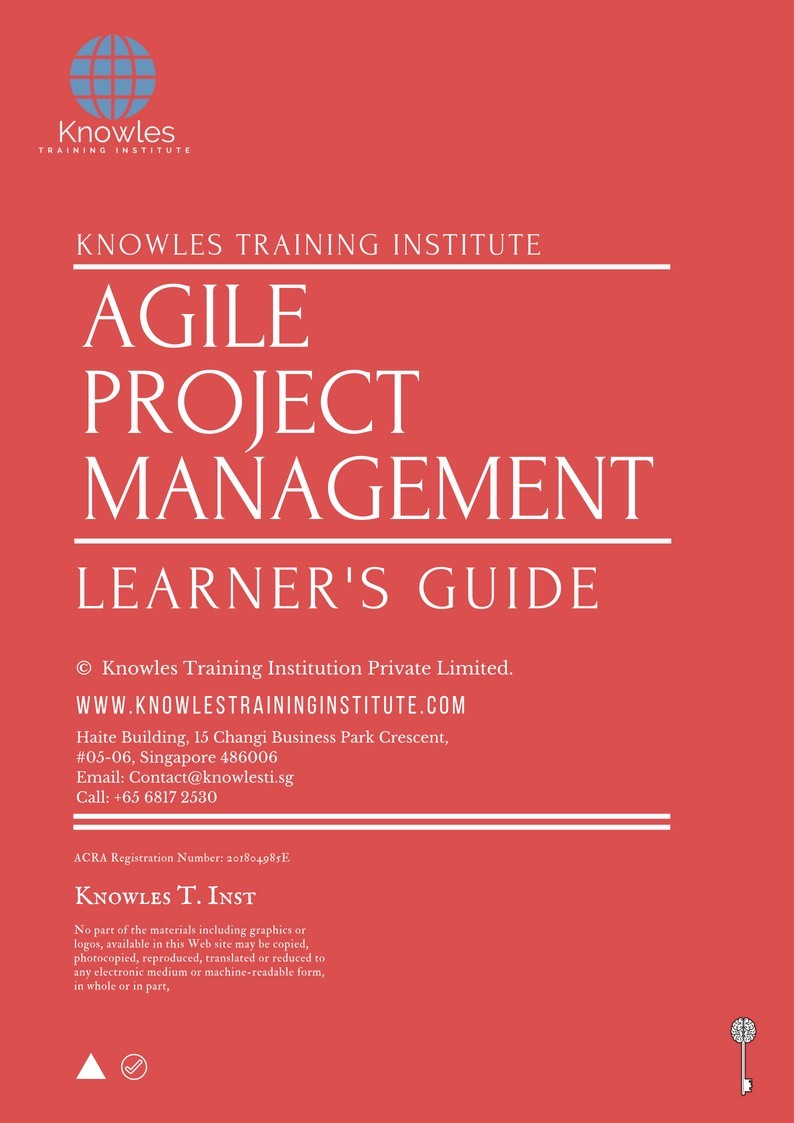
Agile Project Management Course in Germany Handouts
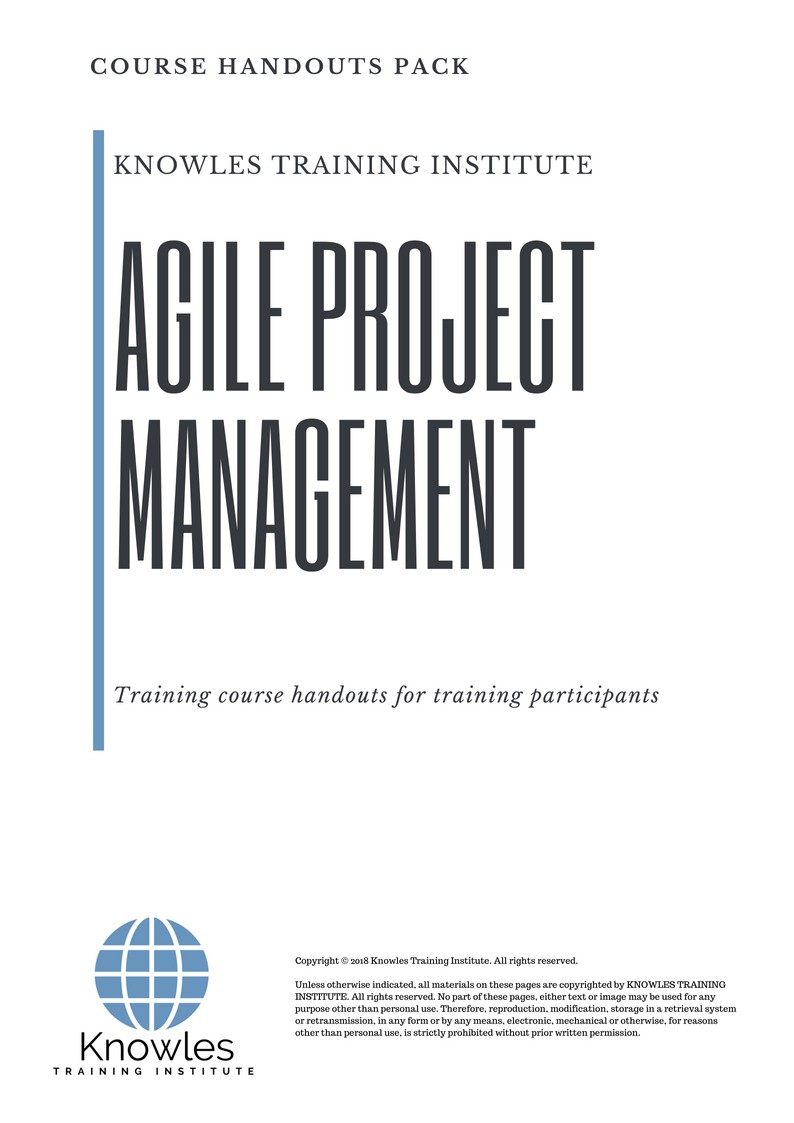
Agile Project Management Course in Germany PPT Slides Used During Course

Agile Project Management Training Course in Germany Certification
Each course participant will receive a certification of training completion
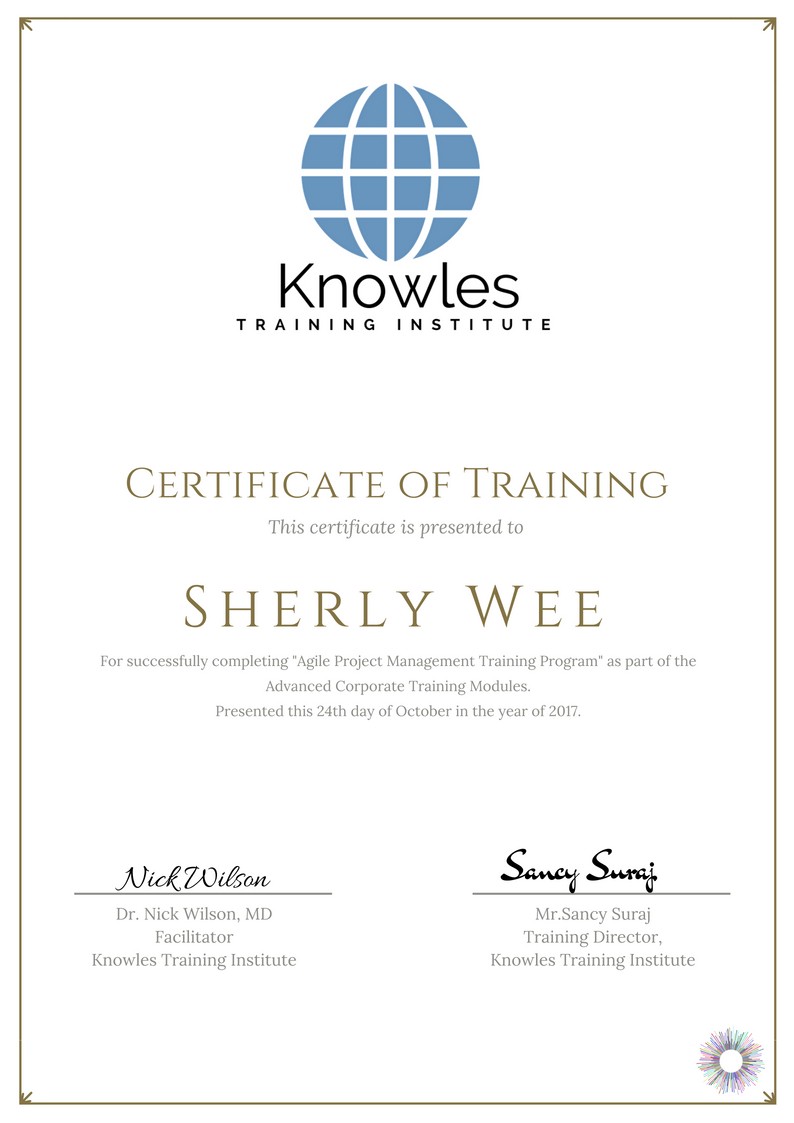
Course Fees For Agile Project Management Training Course In Germany
There are 4 pricing options available for this Agile Project Management training course in Germany. Course participants not in Germany may choose to sign up for our online Agile Project Management training course in Germany.
- USD 1,019.96 For a 60-minute Lunch Talk Session.
- USD 434.96 For a Half Day Course Per Participant.
- USD 659.96 For a 1 Day Course Per Participant.
- USD 884.96 For a 2 Day Course Per Participant.
Discounts available for more than 2 participants.
Upcoming Agile Project Management Training Course in Germany Schedule
Contact us for the latest Agile Project Management course in Germany schedules:
Email: contact@knowlesti.com.de
Message:
Download Agile Project Management Course in Germany Brochure
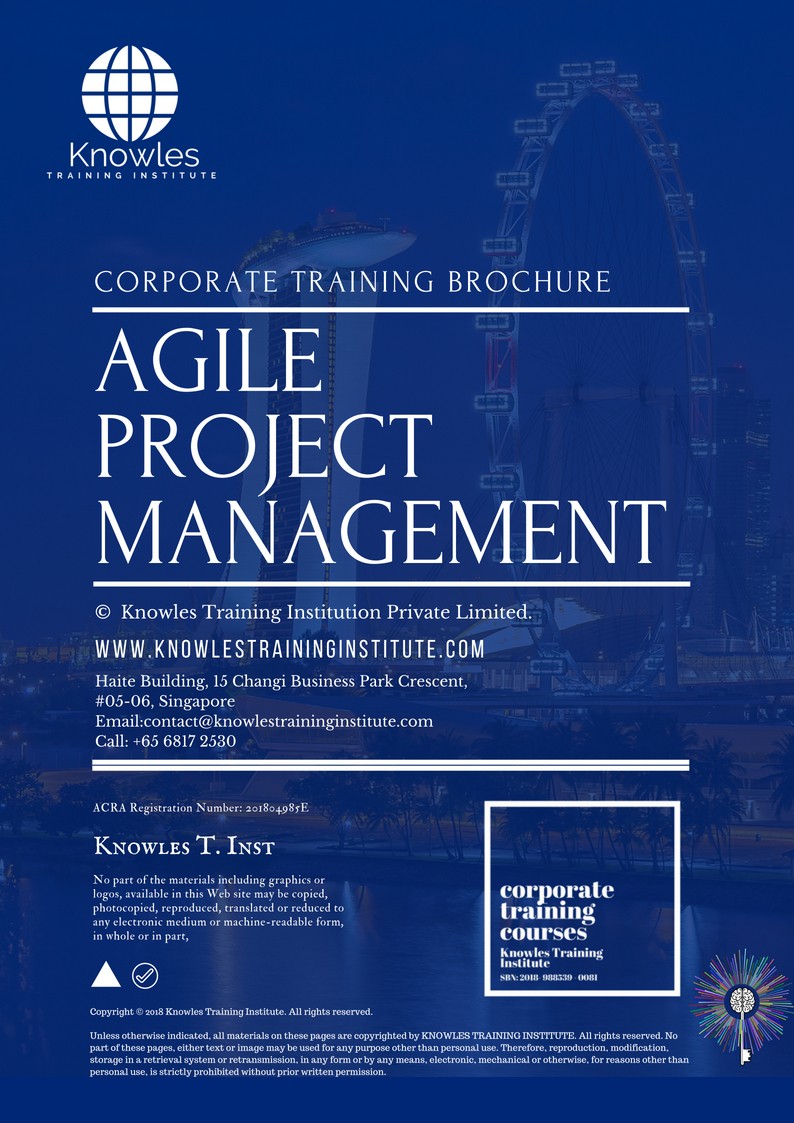
Request for this Agile Project Management course in Germany brochure. Fill up the short information below and we will send it to you right away!
Post Training Support: A vast majority of training does not have any effect beyond 120 days. To work, training has to have a strong pre- and post-training component. Post-training reinforcement helps individuals to recall the understanding and ask questions.
Blended Learning: Learning does not occur in the classroom. Virtually everybody prefers distinct ways of learning. Successful learning should have a multi-channel, multi-modal strategy.
- We Understand The Industry: We’ve got a profound comprehension of the business, business design, challenges, strategy and the that our participants are in and have designed the courseware to cater to their professional needs.
- Course Content: Knowles Training Institute’s material is relevant, of high quality and provide specific learning results. Participants will leave the training course feeling as they have gained a strong understanding and will also be in a position to execute what they have learned sensibly.
Course Development — The workshop modules follow a systematic and logical arrangement. This structure helps to ensure that the course material allows the facilitators to deliver the course in a logical arrangement. Consider the subjects as building bricks into learning, our facilitators slowly build towards a comprehensive picture of this entire topic.
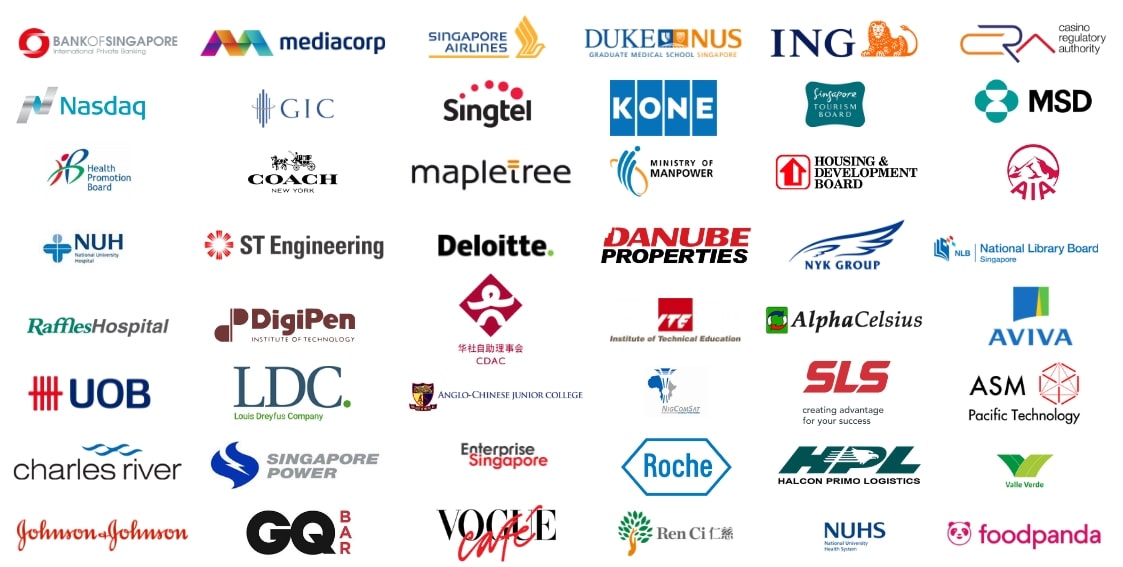

Course Enquiries
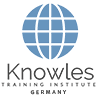
Fill up the form and we will get back to you in less than 1 working day.
Alternatively, give us a call to have one of our training consultants contact you. Our corporate training courses can be contextualized to meet your organization’s training needs. Leverage on our large pool of professional trainers and consultants for your organization’s training needs.
Email: contact@knowlesti.com.de
We Guarantee 100% Privacy. We Respect Your Privacy. Your Information Will Never Be Shared.
